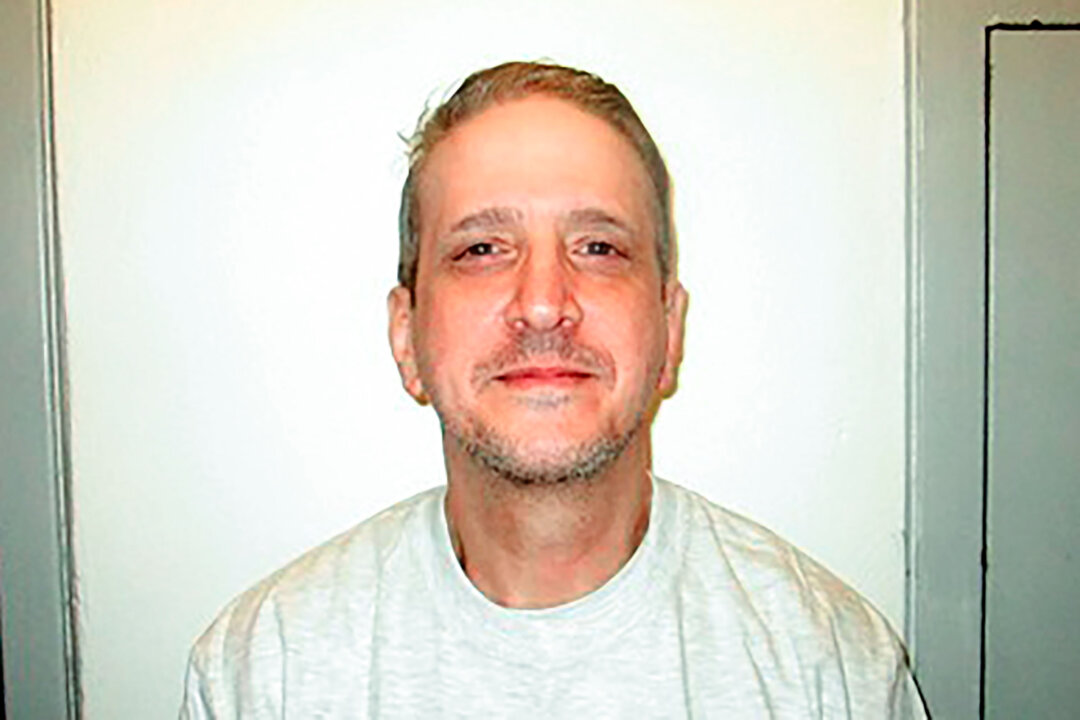The Oklahoma attorney general took the unusual step of siding with the prisoner over his own state’s court of appeals, citing prosecutorial violations.
Oklahoma urged the U.S. Supreme Court on Oct. 9 to throw out the murder conviction of Richard Eugene Glossip after the state admitted the prosecution was flawed.
The nation’s highest court decided on Jan. 22 to hear his appeal after suspending his execution in May 2023.
Glossip, 61, was convicted of murdering his employer, Barry Van Treese, in 1997 while employed as manager of an Oklahoma City motel. Justin Sneed, also convicted in the killing, was given life imprisonment without parole in a plea deal that required him to testify against his co-worker. Glossip admitted he assisted Sneed in concealing the murder after the fact but said he didn’t know Sneed intended to kill the victim.
At the time of the murder, Sneed was a methamphetamine addict whom Glossip had hired to do maintenance work at the motel. Sneed told police that Glossip offered him $10,000 to kill Van Treese.
But Oklahoma Attorney General Gentner Drummond discovered that prosecutors had withheld materials from the defense.
These items, collectively known as “Box 8,” revealed that Sneed was allowed to present false testimony without disclosing that he had been prescribed lithium by a psychiatrist for a serious psychiatric condition, Drummond said.
Related Stories


He recommended that Glossip’s murder conviction be set aside because of prosecutorial misconduct, in which case the state would retry him.
Despite that, the Court of Criminal Appeals for Oklahoma ruled against Glossip in April 2023. The Oklahoma Pardon and Parole Board denied his bid for clemency later the same month.
Last year, Drummond told the Supreme Court that the state had arrived at “the difficult decision to confess error and support vacating the conviction” after evidence suggesting Glossip’s innocence surfaced.
The Oklahoma court’s “decision cannot be the final word in this case. The injustice of allowing a capital sentence to be carried out where the conviction was occasioned by the government’s own admitted failings would be nigh unfathomable,” Drummond told the justices.
During the oral argument at the Supreme Court on Oct. 9, former U.S. Solicitor General Seth Waxman said his client was “convicted on the word of one man” and that his conviction violated the constitutional right to due process, or basic procedural fairness.
The state later disclosed evidence showing Sneed lied to jurors about the fact that a prison psychiatrist gave him lithium to treat his bipolar disorder. The state withheld that evidence and did not correct his testimony, Waxman said.
Justice Clarence Thomas asked why prosecutors involved in the case had not been questioned.
“Not only because their reputations are being impugned, but [because] they are central to this case, it would seem that an interview of these two prosecutors would be central,” the justice said.
Chief Justice John Roberts questioned what impact Sneed’s lithium use had on the jury.
Would the jury have cared, he asked, “if they knew that the lithium had been prescribed by a psychiatrist as opposed to someone else?”
“Do you really think it would make that much of a difference to the jury?” Roberts said.
Waxman replied, “It very well could have made a significant difference in the outcome of the case.”
Oklahoma’s attorney, Paul Clement, also a former U.S. solicitor general, said the state was siding with the prisoner in this appeal because fairness demanded it.
“Attorney General Drummond did not confess error here lightly indeed,” Clement said.
Drummond supports the death penalty as a policy, “but after commissioning an independent review, he reluctantly reached the conclusion that Brady and Napue violations by the state’s own prosecutors obligated him to confess error and waive procedural obstacles, as his predecessor had done in McCarty.”
Several justices also expressed concern that the prosecution may have run afoul of the two Supreme Court precedents Clement referenced that govern criminal law proceedings.
Clement was referring to Napue v. Illinois (1959), in which the Supreme Court found that a prosecutor’s deliberate use of false testimony violates the Due Process Clause of the Fourteenth Amendment, even if the evidence only related to the credibility of a witness, as opposed to the defendant’s guilt or innocence. In Brady v. Maryland (1963), the court held a prosecutor’s failure to disclose significant evidence it possesses that suggests the defendant may not be guilty was also a Due Process Clause violation.
Curtis McCarty was cleared of murder in 2007 following two decades on death row for a 1982 Oklahoma City killing he did not commit. Prosecutorial misconduct was a factor in the case.
Justice Brett Kavanaugh told Christopher Michel, an attorney the justices appointed to defend the Oklahoma court’s judgment, that he was “having some trouble” because “the whole case depended on [Sneed’s] credibility.”
The issue of Sneed’s mental health generates “all sorts of avenues for questioning his credibility.”
Michel said Drummond’s confession of error needs to be taken with a grain of salt because courts, not executives, determine whether to vacate final judgments of conviction.”
After the hearing, Waxman told The Epoch Times he and his client are “both very, very grateful to the Supreme Court for considering our arguments. … For goodness’s sake, let’s give this man a fair trial in which he has the information that he’s entitled to, to defend himself.”
Justice Neil Gorsuch was recused from the case and didn’t take part in the oral argument.
Sam Dorman contributed to this report.

















































